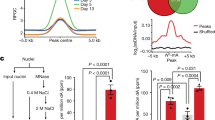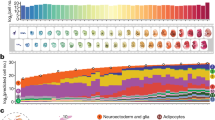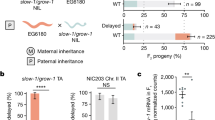Abstract
A protein known as heat-shock factor-1 (HSF1) is a major transactivator of stress-inducible genes in response to environmental changes, but it is also implicated in extra-embryonic development and female fertility in mice1,2. Here we show that mouse embryos whose mothers lack this protein are unable to develop properly beyond the zygotic stage, although oocytes were ovulated and fertilized normally. Wild-type spermatozoa do not save zygotes from lethality, indicating that the reproductive failure of females deficient in this factor is caused by a 'maternal effect' mutation3, and that HSF1 from the mother normally controls early post-fertilization development.
This is a preview of subscription content, access via your institution
Access options
Subscribe to this journal
Receive 51 print issues and online access
$199.00 per year
only $3.90 per issue
Buy this article
- Purchase on Springer Link
- Instant access to full article PDF
Prices may be subject to local taxes which are calculated during checkout

Similar content being viewed by others
References
McMillan, D. R., Xiao, X., Shao, L., Graves, K. & Benjamin, I. J. J. Biol. Chem. 273, 7523– 7528 (1998).
Xiao, X. et al. EMBO J. 18, 5943–5952 ( 1999).
Schupbach, T. & Wieschaus, E. Genetics 121, 101–117 (1989).
Jedlicka, P., Mortin, M. A. & Wu, C. EMBO J. 16, 2452– 2462 (1997).
Greenhouse, S., Rankin, T. & Dean, J. Am. J. Hum. Genet. 62, 1282– 1287 (1998).
Schultz, R. M. BioEssays 15, 531–538 ( 1993).
Bensaude, O., Babinet, C., Morange, M. & Jacob, F. Nature 305, 331–333 (1983).
Christians, E., Campion, E., Thompson, E. M. & Renard, J. P. Development 121, 113–122 (1995).
Christians, E. et al. Mol. Cell Biol. 17, 778–788 (1997).
Bevilacqua, A., Fiorenza, M. T. & Mangia, F. Development 127, 1541– 1551 (2000).
Latham, K. E., Garrels, J. I., Chang, C. & Solter, D. Development 112, 921–932 (1991).
Davis, W. Jr & Schultz, R. M. Dev. Biol. 218, 275–283 ( 2000).
Author information
Authors and Affiliations
Corresponding author
Rights and permissions
About this article
Cite this article
Christians, E., Davis, A., Thomas, S. et al. Maternal effect of Hsf1 on reproductive success. Nature 407, 693–694 (2000). https://doi.org/10.1038/35037669
Issue Date:
DOI: https://doi.org/10.1038/35037669
This article is cited by
-
Maternal effect factors that contribute to oocytes developmental competence: an update
Journal of Assisted Reproduction and Genetics (2022)
-
Dynamics of the epigenetic landscape during the maternal-to-zygotic transition
Nature Reviews Molecular Cell Biology (2018)
-
Cloning and expression analysis of zygote arrest 1 (Zar1) in New Zealand white rabbits
Journal of Genetics (2017)
-
Human oocyte developmental potential is predicted by mechanical properties within hours after fertilization
Nature Communications (2016)
-
BTG4 is a meiotic cell cycle–coupled maternal-zygotic-transition licensing factor in oocytes
Nature Structural & Molecular Biology (2016)
Comments
By submitting a comment you agree to abide by our Terms and Community Guidelines. If you find something abusive or that does not comply with our terms or guidelines please flag it as inappropriate.



